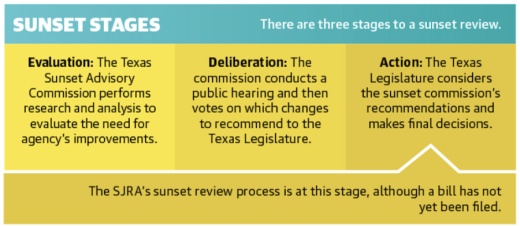Sunset reviews are conducted by the Texas Sunset Advisory Commission, which may recommend improvements to state agencies or recommend abolishing them altogether, although river authorities are not subject to abolishment. The SJRA’s review is in the third stage, in which the committee has written an initial report and plans to file a bill in the Texas Legislature consisting of its recommendations.
According to state Sen. Brandon Creighton, R-Conroe, the sunset review has been extended to the next legislative session to provide the legislature and public more time to make recommendations.
Kevin Lacey, the president of the Lake Conroe Association, an entity that advocates for homeowners on the lake, said he was disappointed the report did not discuss the seasonal Lake Conroe lowering, a controversial flood mitigation strategy that is largely supported by residents in areas downstream such as Kingwood but opposed by homeowners on the lake.
“Not once in their sunset report ... did they even mention this hugely contentious program,” Lacey said. “We were scratching our heads.”
Meanwhile, SJRA General Manager Jace Houston said that sunset reviews are similar to a management and efficiency audit and are not designed to examine policy issues.
Sunset findings
The sunset advisory commission was established in 1977, when scandals at the federal and state levels had diminished public confidence in government institutions, according to the commission’s website. Since its creation, the committee has abolished 92 agencies, and has 131 agencies scheduled for review in the next 12 years.
The sunset advisory staff report for the SJRA found the agency “executes its core water supply operations well but needs to improve key support functions.” Some of the areas the report highlighted as needing improvement include communication and engagement with the public as well as its contracting and procurement methods.
Several individuals provided input, some of which fell outside the sunset review’s scope, according to the commission. Ronald McEachern, a resident of the city of Montgomery, called for an end to the seasonal lowering, independent studies to assess the causes of flooding and to switch the SJRA board from an appointed to an elected board.
“There is little transparency and no fairness for the Lake Conroe area,” he said.
However, the sunset commission did not factor this input into its report. Instead, the report focused only on certain aspects of SJRA’s operation and did not review broader water policy issues or topics under litigation. The report concludes the recommendations should not have a significant impact on the SJRA.
Regarding the recommendation for the SJRA to improve its public communication, Lacey said public meetings for the lake lowering could have been more productive if there had been smaller workshops so individuals could have presented technical studies. Rather, the meetings were often contentious and passionate, he said.
“They decided to just use the town hall process, which had limited ability to put deep technical reports or studies in front of the board,” he said.
Legal, legislative efforts
Local elected officials are also looking into the SJRA. State Rep. Will Metcalf, R-Conroe, has filed a bill that would replace the board with an elected board; similar bills have been filed in the past that did not pass.
Metcalf said in an email he was disappointed with what he called “lack of community involvement opportunities” to make substantial, legislative changes to the way SJRA operates.
“I was extremely discouraged that the sunset commission’s report did not address any legislative reforms related to the seasonal lake lowering program,” he said. “I am hopeful that through the continued pressure of our citizens on the SJRA board, as well as through the [Texas Commission on Environmental Quality] and other legal avenues, we will be successful in ending this harmful program once and for all.”
Sen. Dawn Buckingham, vice chair of the sunset commission, did not provide comment before publication time. SJRA submitted a 5-page response to the recommendations, which outlined the steps the agency will take or has taken, such as hiring a new procurement manager.
Meanwhile, Houston said he felt the review was extensive and thorough; the recommendations were “very good;” and policy issues fall outside the sunset’s scope.
He also said there were various opportunities for the public to be involved during the process.
SJRA’s website provides information about the sunset review, including where to provide comments and suggestions, although this deadline has since expired. A link is also available to sign up for email alerts on the sunset staff report and the sunset commission’s public meetings.
As for the lake lowering meetings, Houston said the townhall meetings were necessary to let the public weigh in, and there have been various opportunities to voice concern.
“You have to give the general public a time and a place ... to make their voice heard,” he said. “We did what we felt was the right thing to do.”





